[Research Report] The Public Opinion Survey on Mental Health (August 12, 2022)
date : 8/12/2022
![[Research Report] The Public Opinion Survey on Mental Health (August 12, 2022)](https://hgpi.org/en/wp-content/uploads/sites/2/mh-20220812-top_ENG.jpg)
Health and Global Policy Institute (HGPI) has presented the results of a public opinion survey on mental health. The survey was conducted in March 2022 among 1,000 people selected by region, age, and sex in ratios in that correspond to the demographics of the total population of Japan.
Respondents were asked who they seek support from when experiencing mental distress and were allowed to select multiple options. Although over half selected “a family member or relative,” almost one-third (30%) said they have nobody to go to for support, showing that there is a limited number of people and places offering support to those who experience mental distress. Furthermore, less than 5% of respondents selected counseling services paid out-of-pocket, counseling services provided by employers, or public counseling services, which shows that these services are not available as options. Conversely, the most common response following “a family member or relative” and “a friend or acquaintance” was “my family doctor (other than a psychiatrist).” This suggests the importance of family doctors and the need for them to be able to provide their patients with appropriate treatments for mental health-related issues (Figure 1).
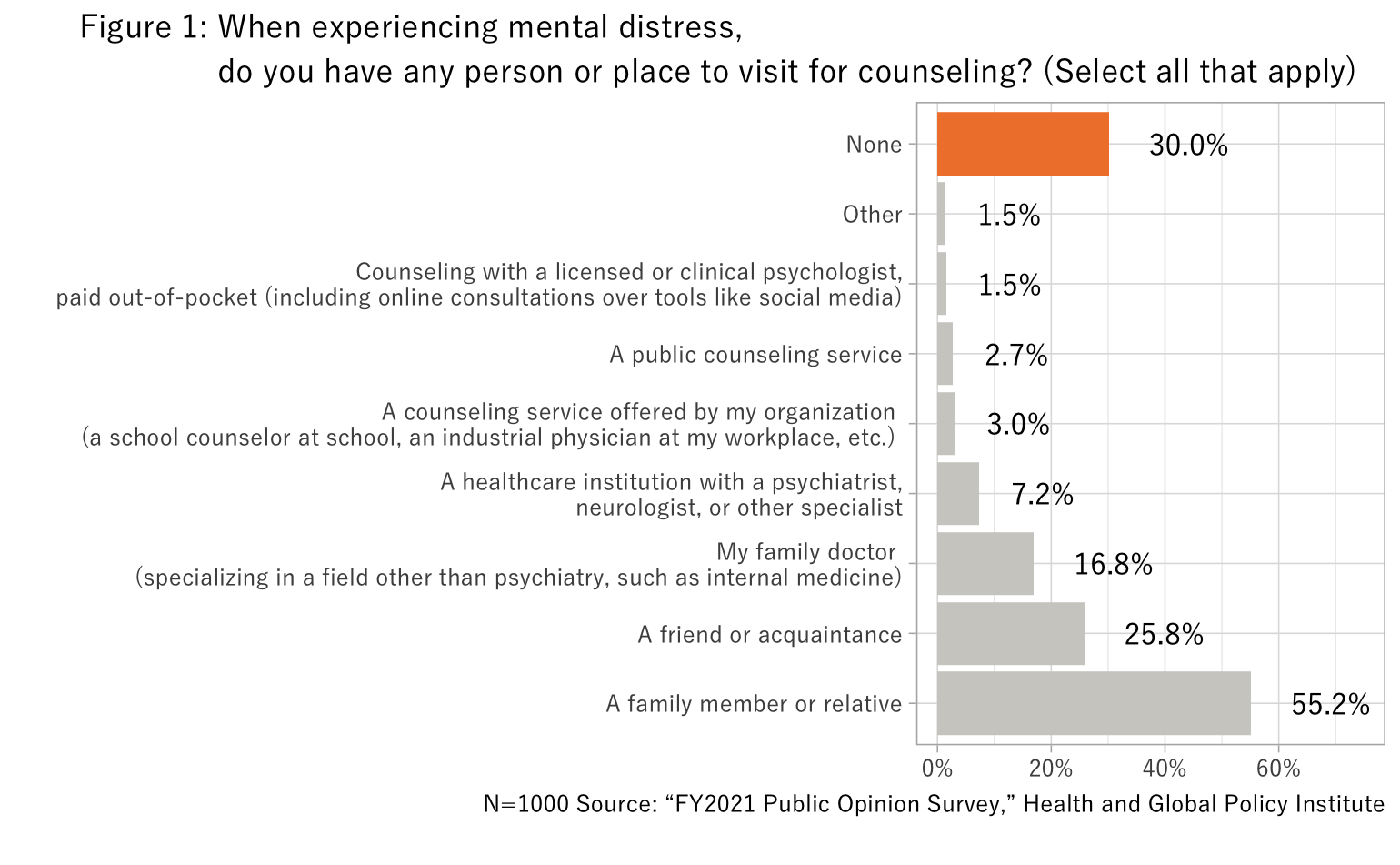
When asked about their social interactions outside of communities like the home, school, and the workplace, over 70% of respondents said they either had no such interactions or that the COVID-19 pandemic prevented them from maintaining connections with others. Given that more than 60% of respondents said they had been unable to secure a variety of opportunities for social interactions in the past, we can conclude that the COVID-19 pandemic further exacerbated their circumstances (Figure 2).
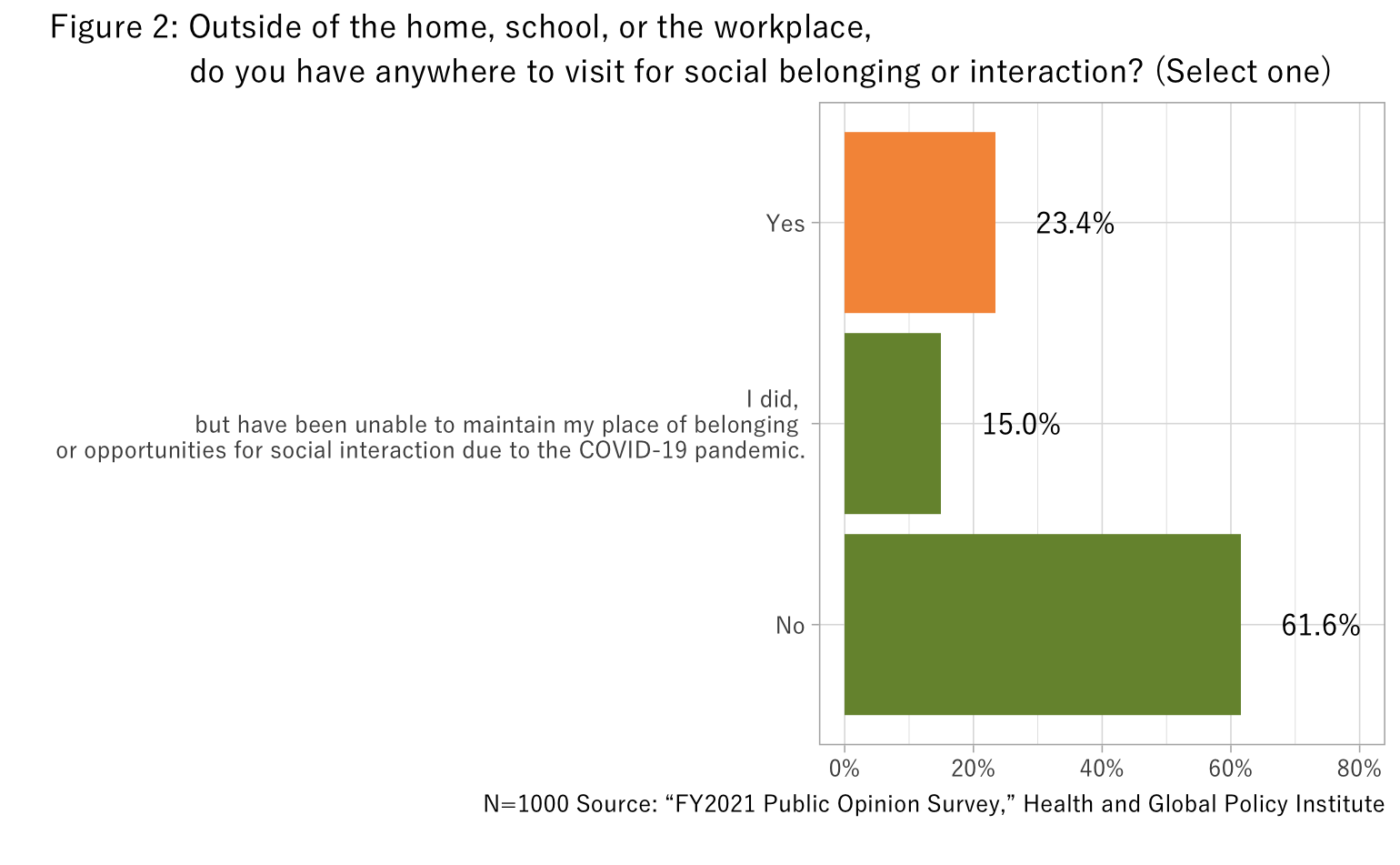
In FY2021, HGPI presented policy recommendations for the dissemination of Cognitive Behavioral Therapy (CBT). This survey showed that recognition toward the term “Cognitive Behavioral Therapy” was extremely low, at 16.1% (Figure 3).
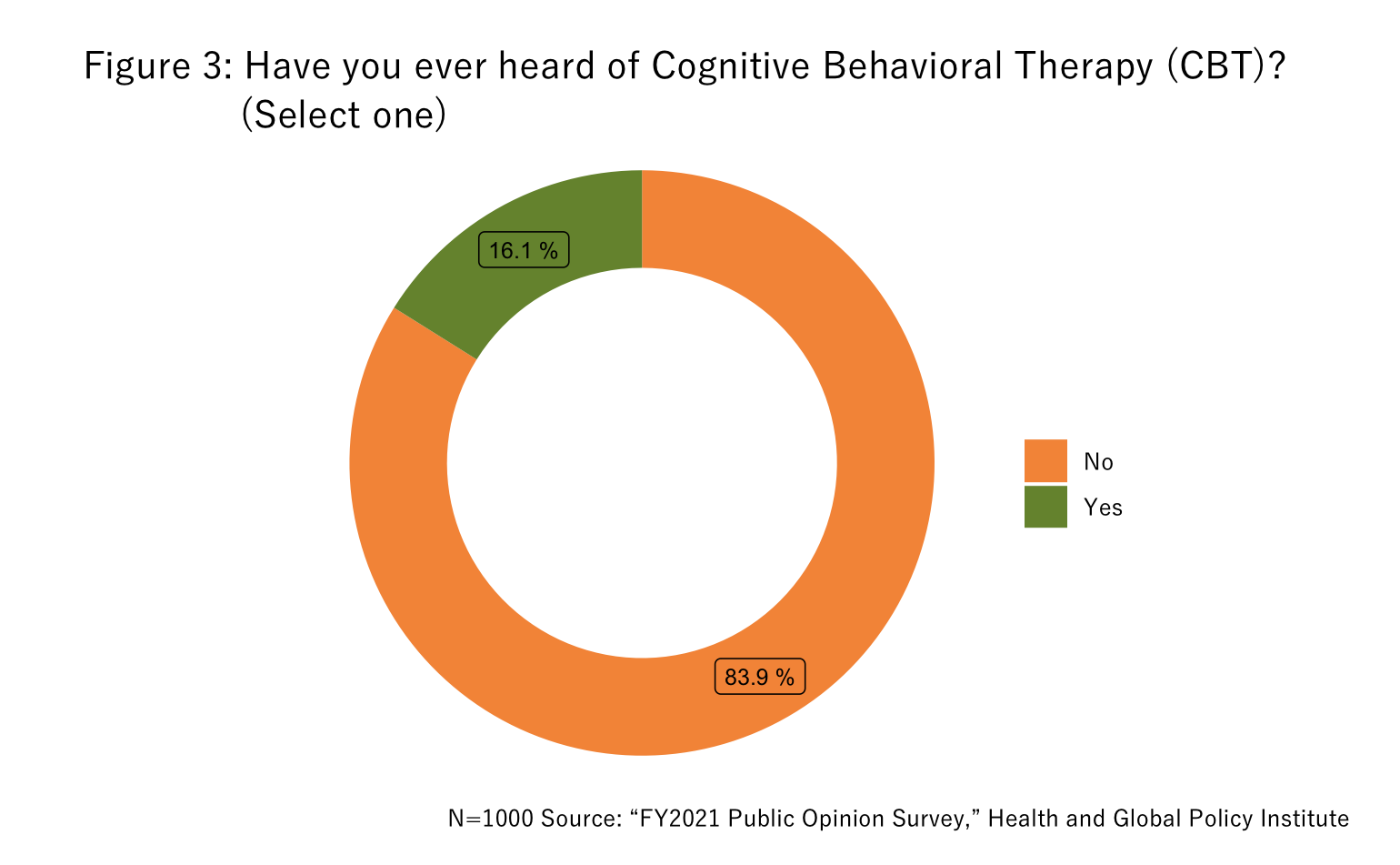
There was low awareness toward the fact that mental health counseling services are available from local governments and healthcare institutions during emergencies, suggesting that it may be important to publicize the names of specific facilities offering these services in each community and to promote awareness toward them. Given the fact that this survey included pandemics in the definition of “emergencies,” and that there was an ongoing pandemic during the survey period, it is especially important that urgent steps are taken to build awareness toward these services (Figure 4).
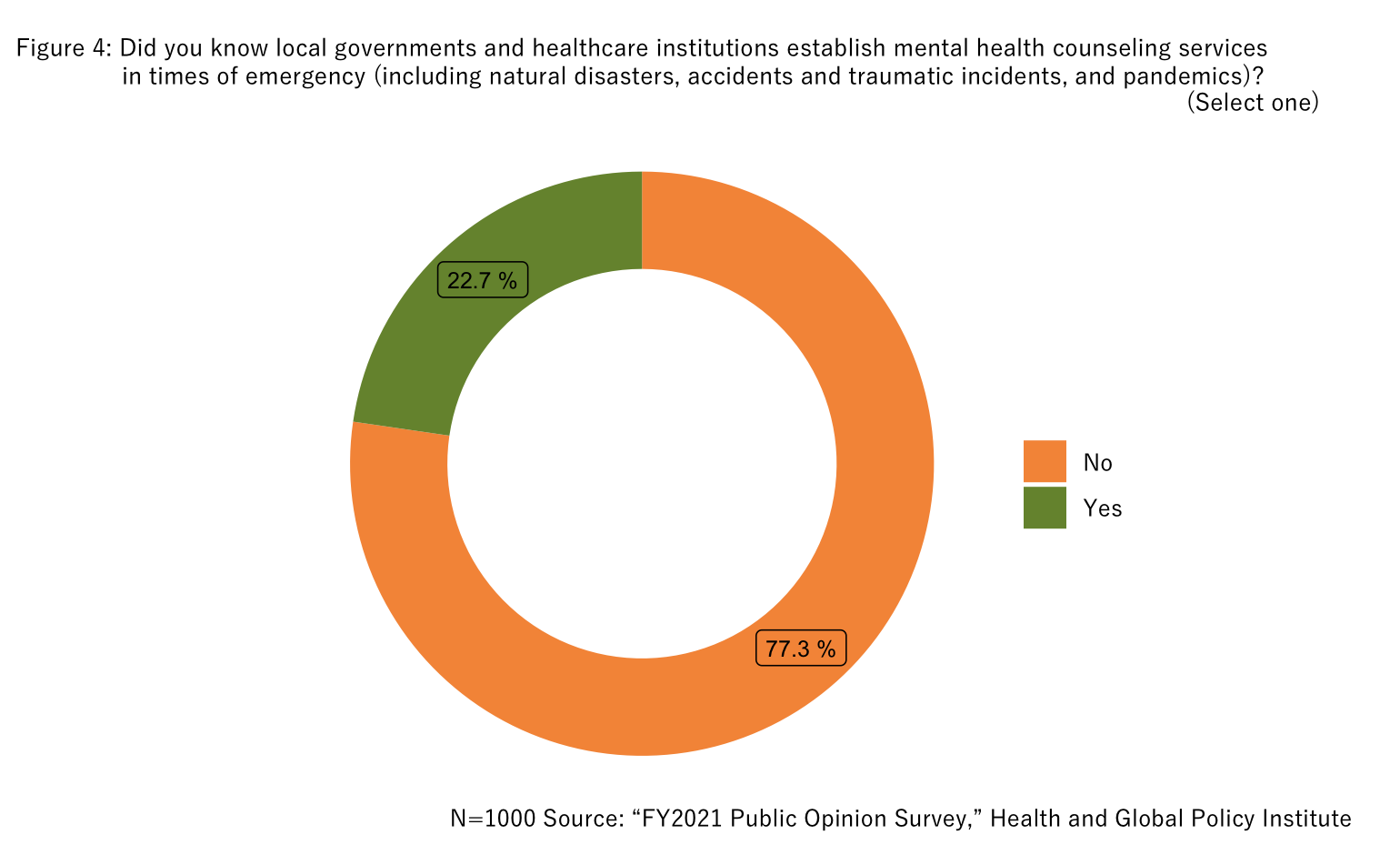
When asked about their desire to use mental health counseling services during emergencies in the future, among those who said they have nobody to consult on mental health-related issues (approximately 30%, Figure 1), over two-thirds (69.4%) said they would like to receive counseling support remotely, either online (49.2%) or by telephone (28.6%). As physical and social factors may prevent people from connecting during emergencies, this finding suggests utilizing digital technology to deliver mental health care remotely will be effective during all types of emergencies and that the public has high expectations toward this area (Figure 5).
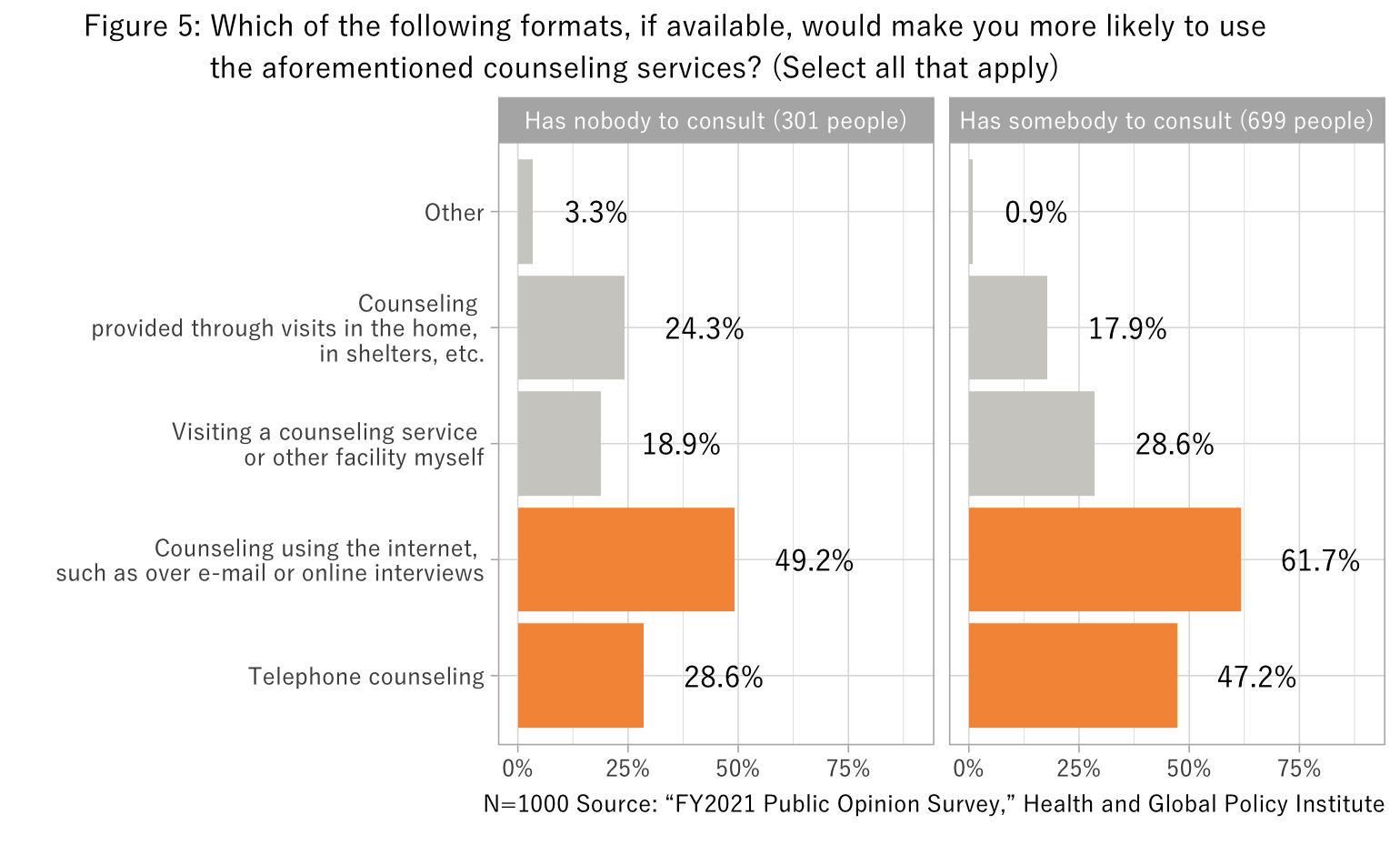
The results of the HGP public opinion survey on mental health show that approximately 30% of respondents said they have nobody to consult in times of mental distress. This suggests there is a certain number of people who are at risk of developing severe mental health issues because they are unable to act fast when experiencing mental health-related problems. At the same time, “my family doctor” was the third most-popular choice regarding parties to consult. This provides a key suggestion for future health policy. One option for the future might be to expand mental health support systems centered on family doctors.
In the area of disaster mental health care, many respondents expressed positive opinions regarding remote counseling systems, such as those using the internet. Now that it is the norm for everyone to carry a mobile device, this result may be able to provide a tailwind to efforts for making mental health care more accessible to all, even during normal times.
Historically, recognition toward CBT, which is used to treat many mental disorders including depression and schizophrenia, has been low. However, in a society where digitalization is continuously advancing, CBT is beginning to see wider usage, such as through phone apps for mental health care, and it is likely this field will be highly compatible with the public’s expectations toward the digitalization of care.
It has also been observed that digital devices helped people stay connected with each other during the COVID-19 pandemic, which suggests such devices can help people maintain mental well-being in times of emergency, such as during pandemics or after major earthquakes.
HGPI is engaged in various activities for mental health. For details regarding this project, please view our posts with the mental health tag at this link.
[References]
• Ministry of Internal Affairs and Communications. “2021 White Paper on Information and Communications in Japan: ‘Livelihood and Economy Supported by Digital Technologies.’” (Last retrieved July 20, 2022)
• National Center for Cognitive Behavior Therapy and Research. “What is Cognitive Behavioral Therapy?” (Last retrieved July 20, 2022)
Top Research & Recommendations Posts
- [Policy Recommendations] Achieving a Sustainable Society of Health and Longevity Through the Integration of Environment and Healthcare-Incorporating a Planetary Health Perspective into the 3rd Phase of The Healthcare Policy-(December 20, 2024)
- [Research Report] Building a Mental Health Program for Children and Measuring its Effectiveness (June 16, 2022)
- [Policy Recommendations] Developing a National Health and Climate Strategy for Japan (June 26, 2024)
- [Research Report] The 2023 Public Opinion Survey on Satisfaction in Healthcare in Japan and Healthcare Applications of Generative AI (January 11, 2024)
- [Policy Recommendations] Policy Recommendations on Strengthening CKD Strategies for Workers: The Importance of Providing Early Detection, Intervention, and Support Through Screenings and Medical Visits (October 28, 2024)
- [Policy Recommendations] Integrating Climate and Health for a Sustainable Society: Incorporating a Planetary Health Perspective into Nationally Determined Contributions (NDCs)(December 9, 2024)
- [Research Report] 2019 Survey on Healthcare in Japan
- [Event Report] Planetary Health Expert Meeting Aiming for Sustainable Healthcare: Learning from the Impact of Environmental Pollution and Medical Waste During the Pandemic (February 16, 2024)
- [Announcement] A Turning Point Towards Building Green Healthcare Systems (June 5, 2024)
- [Research Report] Survey of Japanese Physicians Regarding Climate Change and Health (December 3, 2023)
Featured Posts
-
2024-11-25
[Registration Open] (Webinar) The 130th HGPI Seminar “Marking a Decade of the Act on Medical Care for Patients With Intractable Diseases: Connecting Intractable Diseases and Society From the Perspective of a Media Professional and Family Member” (January 28, 2025)
![[Registration Open] (Webinar) The 130th HGPI Seminar “Marking a Decade of the Act on Medical Care for Patients With Intractable Diseases: Connecting Intractable Diseases and Society From the Perspective of a Media Professional and Family Member” (January 28, 2025)](https://hgpi.org/en/wp-content/uploads/sites/2/hs130-top_JPNENG-1.png)
-
2025-01-21
[Event Report] The 129th HGPI Seminar “The Connection Between Planetary Environment and Human Health as Seen Through the JECS and Future Expectations” (December 23, 2024)
![[Event Report] The 129th HGPI Seminar “The Connection Between Planetary Environment and Human Health as Seen Through the JECS and Future Expectations” (December 23, 2024)](https://hgpi.org/en/wp-content/uploads/sites/2/hs129-top-1.png)
-
2025-01-22
[Registration Open] HGPI Salon 2025 “Looking Ahead to the Future of Japan’s Social Security System” Session 1: Improving Productivity through the Streamlining of Healthcare and Long-Term Care Services and the Utilization of ICT (February 14, 2025)
![[Registration Open] HGPI Salon 2025 “Looking Ahead to the Future of Japan’s Social Security System” Session 1: Improving Productivity through the Streamlining of Healthcare and Long-Term Care Services and the Utilization of ICT (February 14, 2025)](https://hgpi.org/en/wp-content/uploads/sites/2/be4118c73d0fb7d465c268cdfac101e3.png)
-
2025-01-23
[HGPI Policy Column] (No.52) From the Mental Health Project “Patient and Public Involvement (PPI) and Precision Medicine Approaches in Mental Health Care”
![[HGPI Policy Column] (No.52) From the Mental Health Project “Patient and Public Involvement (PPI) and Precision Medicine Approaches in Mental Health Care”](https://hgpi.org/en/wp-content/uploads/sites/2/HGPI_20241210_PolicyColumn_eyecatch.png)




